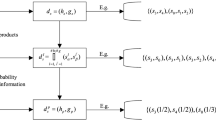Abstract
In this article, incomplete hesitant fuzzy preference relations are under consideration. In order to estimate expressible missing preferences, a hesitant upper bound condition (hubc) is defined for decision makers presenting incomplete information. With the help of this condition, the estimated preference intensities lie inside the defined domain and thus are expressible. An algorithm is proposed to revise minimal possible preferences so that the resultant satisfies property (hubc). Moreover, ranking rule, HF-Borda count, for hesitant fuzzy preference relations is defined. This method dissolves possible ties among alternatives.

Similar content being viewed by others
References
Zadeh, L.A.: Fuzzy sets. Inf. Control 8(3), 338–353 (1965)
Dubois, D.: The role of fuzzy sets in decision sciences: old techniques and new directions. Fuzzy Sets Syst. 184, 3–28 (2011)
Herrera-Viedma, E., Herrera, F., Chiclana, F., Luque, M.: Some issues on consistency of fuzzy preference relations. Eur. J. Oper. Res. 154(1), 98–109 (2004)
Tanino, T.: Fuzzy preference relations in group decision making. Non-conventional Preference Relations in Decision Making, pp. 54–71. Springer, Berlin (1988)
Chiclana, F., Herrera, F., Herrera-Viedma, E.: Integrating multiplicative preference relations in a multipurpose decision-making model based on fuzzy preference relations. Fuzzy Sets Syst. 122(2), 277–291 (2001)
Herrera, F., Herrera-Viedma, E., Chiclana, F.: Multiperson decision-making based on multiplicative preference relations. Eur. J. Oper. Res. 129(2), 372–385 (2001)
Saaty, T.L.: What is the Analytic Hierarchy Process?. Springer, Berlin (1988)
Wang, T. C., Chen, Y. H.: A new method on decision-making using fuzzy linguistic assessment variables and fuzzy preference relations. In: The proceedings of the 9th world multi-conference on systemics, cybernetics and informatics, Orlando, pp. 360–363 (2005)
Torra, V.: Hesitant fuzzy sets. Int. J. Intell. Syst. 25(6), 529–539 (2010)
Torra, V., Narukawa, Y.: On hesitant fuzzy sets and decision. In: IEEE International Conference on Fuzzy Systems (FUZZ-IEEE) 2009, pp. 1378–1382. IEEE
Xia, M., Xu, Z.: Hesitant fuzzy information aggregation in decision making. Int. J. Approx. Reason. 52(3), 395–407 (2011)
Beg, I., Rashid, T.: TOPSIS for hesitant fuzzy linguistic term sets. Int. J. Intell. Syst. 28, 1162–1171 (2013)
Rodriguez, R.M., Martinez, L., Herrera, F.: Hesitant fuzzy linguistic term sets for decision making. IEEE Trans. Fuzzy Syst. 20(1), 109–119 (2012)
Massanet, S., Riera, J.V., Torrens, J., Herrera-Viedma, E.: A new linguistic computational model based on discrete fuzzy numbers for computing with words. Inf. Sci. 258, 277–290 (2014)
Riera, J.V., Massanet, S., Herrera-Viedma, E., Torrens, J.: Some interesting properties of the fuzzy linguistic model based on discrete fuzzy numbers to manage hesitant fuzzy linguistic information. Appl. Soft Comput. 36, 383–391 (2015)
Beg, I., Rashid, T.: Hesitant 2-tuple linguistic information in multiple attributes group decision making. J. Intell. Fuzzy Syst. (2016)
Chiclana, F., Herrera-Viedma, E., Alonso, S.: A note on two methods for estimating missing pairwise preference values. Syst. Man Cybern. 39, 1628–1633 (2009)
Fedrizzi, M., Giove, S.: Incomplete pairwise comparison and consistency optimization. Eur. J. Oper. Res. 183(1), 303–313 (2007)
Khalid, A., Awais, M.M.: Incomplete preference relations: an upper bound condition. J. Intell. Fuzzy Syst. 26(3), 1433–1438 (2014)
Khalid, A., Awais, M.M.: Comparing ranking methods: complete RCI preference and multiplicative preference relations. J. Intell. Fuzzy Syst. 27, 849–861 (2014)
Urena, R., Chiclana, F., Morente-Molinera, J.A., Herrera-Viedma, E.: Managing incomplete preference relations in decision making: a review and future trends. Inf. Sci. 302, 14–32 (2015)
Wu, J., Chiclana, F., Herrera-Viedma, E.: Trust based consensus model for social network in an incomplete linguistic information context. Appl. Soft Comput. 35, 827–839 (2015)
Zhu, B., Xu, Z.: Regression methods for hesitant fuzzy preference relations. Technol. Econ. Develop. Econ. 19(sup1), S214–S227 (2013)
García-Lapresta, J.L., Martínez-Panero, M.: Borda count versus approval voting: a fuzzy approach. Public Choice 112(1–2), 167–184 (2002)
Orlovsky, S.A.: Decision-making with a fuzzy preference relation. Fuzzy Sets Syst. 1(3), 155–167 (1978)
Liao, H., Xu, Z., Xia, M.: Multiplicative consistency of hesitant fuzzy preference relation and its application in group decision making. Int. J. Inf. Technol. Decis. Mak. 13(01), 47–76 (2014)
Black, D., Newing, R.A., McLean, I., McMillan, A., Monroe, B.L.: The Theory of Committees and Elections. University Press, Cambridge (1958)
Mueller, D.C.: The encyclopedia of public choice. Public Choice: An Introduction, pp. 32–48. Springer, New York (2003)
Straffin, P.: Topics in the Theory of Voting. Birkhéiuser, Boston (1980)
Nurmi, H.: Resolving group choice paradoxes using probabilistic and fuzzy concepts. Group Decis. Negot. 10(2), 177–199 (2001)
Cabrerizo, F.J., Chiclana, F., Al-Hmouz, R., Morfeq, A., Balamash, A.S., Herrera-Viedma, E.: Fuzzy decision making and consensus: challenges. J. Intell. Fuzzy Syst. 29(3), 1109–1118 (2015)
Cabrerizo, F.J., Moreno, J.M., Pérez, I.J., Herrera-Viedma, E.: Analyzing consensus approaches in fuzzy group decision making: advantages and drawbacks. Soft Comput. 14(5), 451–463 (2010)
Author information
Authors and Affiliations
Corresponding author
Rights and permissions
About this article
Cite this article
Khalid, A., Beg, I. Incomplete Hesitant Fuzzy Preference Relations in Group Decision Making. Int. J. Fuzzy Syst. 19, 637–645 (2017). https://doi.org/10.1007/s40815-016-0212-y
Received:
Revised:
Accepted:
Published:
Issue Date:
DOI: https://doi.org/10.1007/s40815-016-0212-y




